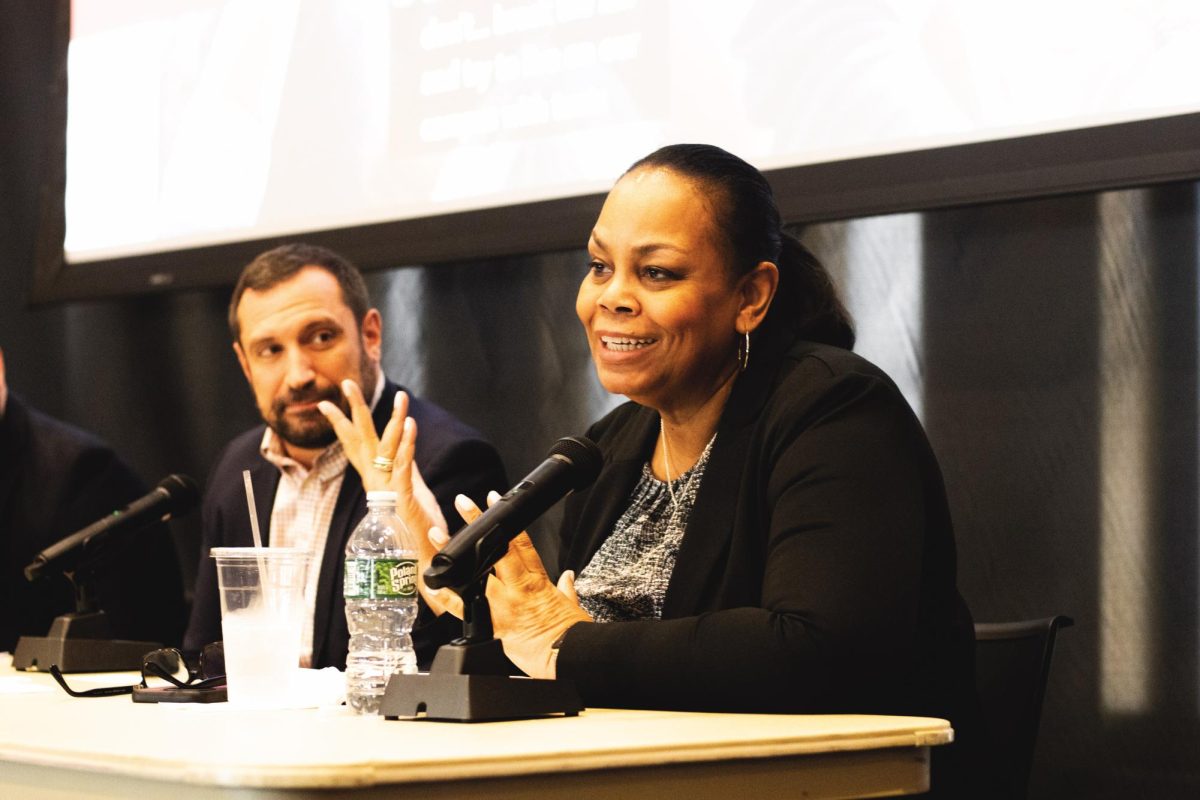On April 25, Fordham educated students on their rights and addressed the community’s concerns on the current immigration climate during a forum held at Lincoln Center.
Nationwide, the legal status of thousands of international students across the country has been restored after being previously cancelled by the federal government. President Donald Trump’s administration has indicated it will continue to pursue more stringent visa screenings.
In a brief introductory speech, Shari Crittendon, vice president of Fordham’s Office of Legal Counsel and general counsel, said the intent of the event was to provide clarity at a moment of uncertainty.
“We thought this would be a great opportunity to have a forum where you could hear about what the facts are — what the truth is at the moment — and be able to ask questions,” Crittendon said. “We want this to be a very safe space for you and we want you to get information.”
“If you do decide to travel, we always recommend checking with a lawyer before you do.” Michael Castiglione, Lawyer at Fragomen
Crittendon emphasized that the event was not providing legal advice, and cautioned audience members to “not get very specific about an issue” when asking questions and to “say it’s hypothetical.”
In order to protect student anonymity, Crittendon said she “asked for no law enforcement to be in this meeting,” and attendees could submit written questions on flashcards. Some attendees asked questions about their own status while others presented their questions as hypotheticals, or concerning a friend.
Crittendon handed the floor to Daniel Pierce, Daniel Schwarz and Michael Castiglione, three lawyers at Fragomen, an international immigration law firm. They gave a presentation and provided advice for international students, starting by discussing the risks of unnecessary travel.
“If you do decide to travel, we always recommend checking with a lawyer before you do,” Castiglione said. “Travel does carry more risk right now than it did before … But as I said, it’s not the same for everybody.”
Castiglione outlined four primary risk factors. The first he mentioned was that criminal records are being more broadly construed when considering immigration petitions, even if an arrest or conviction has been wiped from the record. NPR has reported that immigrants with no criminal record have also been targeted for deportation.
“They’re looking more broadly and using whatever they can find in your record as a reason to give you a harder time,” Castiglione said.
“CBP officers can demand that you show them your phone, that you unlock it, that they look at your emails and your social media and if you refuse to give them access, they can turn you around.” Daniel Pierce, Lawyer at Fragomen
Schwarz said that in the world of immigration law, criminal history is broader than just an arrest record.
“When we use the phrase ‘criminal history,’ it really is interactions with law enforcement history, not necessarily a conviction, not necessarily handcuffs but interaction,” Schwarz said.
The second risk factor, according to Castiglione, is that immigration officers have the authority to search phones at airports and borders. Castiglione said this is not new, but that artificial intelligence tools have given the government easier access to search people’s social media and messages.
“They are emboldened to really take this a little bit further. So at this point, again, it is all very evolving, but we have heard of instances of individuals having their phones checked or social media checked where they have had open statements that were perceived as anti-Semitic, and that caused issues,” Castiglione said.
Later, Pierce added that people should be aware of what electronics they carry across borders and what apps or messages might be seen by Customs and Border Patrol (CBP) officers.
“CBP officers can demand that you show them your phone, that you unlock it, that they look at your emails and your social media and if you refuse to give them access, they can turn you around. So fundamentally, you should be thinking about, ‘Should I be traveling with everything? Do I need my phone to have all of the apps and these other things?’” Pierce said.
Crittendon interjected to remind students of their First Amendment rights to free speech, but emphasized they should remain cautious nonetheless.
“Our constitution’s First Amendment is to even speak against the government. However, you look at each of your individual situations to see if speaking against the government could compromise your ability to live and study in the United States at this moment. So it is an individual decision,” Crittendon said.
Castiglione also outlined individual visa status and potential travel bans as additional risk factors.
These risks arise from two recent executive orders signed by Trump in January. The first stated that “the United States must ensure that admitted aliens and aliens otherwise already present in the United States do not bear hostile attitudes toward its citizens, culture, government, institutions, or founding principles.” The second executive order, aimed at combatting antisemitism on campuses, targeted international students and professors associated with pro-Palestinian protests.
“When you combine those things, there’s a lot of discretion at the end of the government, which then allows them to take some of these policies that the government has made, and really sort of exercise them as they see fit in execution of what their duty is, which is to secure the border and secure the country,” Castiglione said.
“Carrying your documents is critical. It might feel weird because if you lose those documents, it’s a pain in the neck, but it’s important.” Daniel Schwarz, Lawyer at Fragomen
The panelists also gave suggestions as to what to do if approached by ICE or other law enforcement officials, which Schwarz said is a “very unlikely scenario.” Schwarz said students on temporary visas should carry their documents with them when traveling and in their everyday lives.
“Carrying your documents is critical. It might feel weird because if you lose those documents, it’s a pain in the neck, but it’s important,” Schwarz said. “The likelihood of that, again, extremely, extremely low, but those are the two things to remember. Stay cool, contact public safety.”
Schwarz also said students should fill out a change of address form on the U.S. Citizenship and Immigration Services website if they change residential address while on a temporary visa.
Schwarz defined the overall shifts in immigration policy under the Trump administration as working to have immigrants “vetted and screened to the maximum degree possible.”
“That’s the policy, which is to look for reasons and look for issues, be vigilant. Whereas under the prior administration, the goal was maybe a little bit different. It was more of ‘make it efficient’ versus extreme vetting,” Schwarz said. “Everything’s going to be a little bit slower, sometimes a lot.”
Schwarz also said that, while there has been an increase in scrutiny on immigration petitions, there has not yet been an increase in denials.
“We’re not seeing an uptick yet in denials, but we are seeing more questions, which again is not unexpected nor is it outside of the realm of what the government can do under a change in administration,” Schwarz said.
There were around 50 attendees, and the event lasted just under two hours. The first half was devoted to the presentation before the floor was opened for questions.
Fordham will continue to post news on the “Updates on Evolving Political Landscape” webpage. There will be another immigration forum held on Zoom at 1 p.m. on Thursday, May 1.



